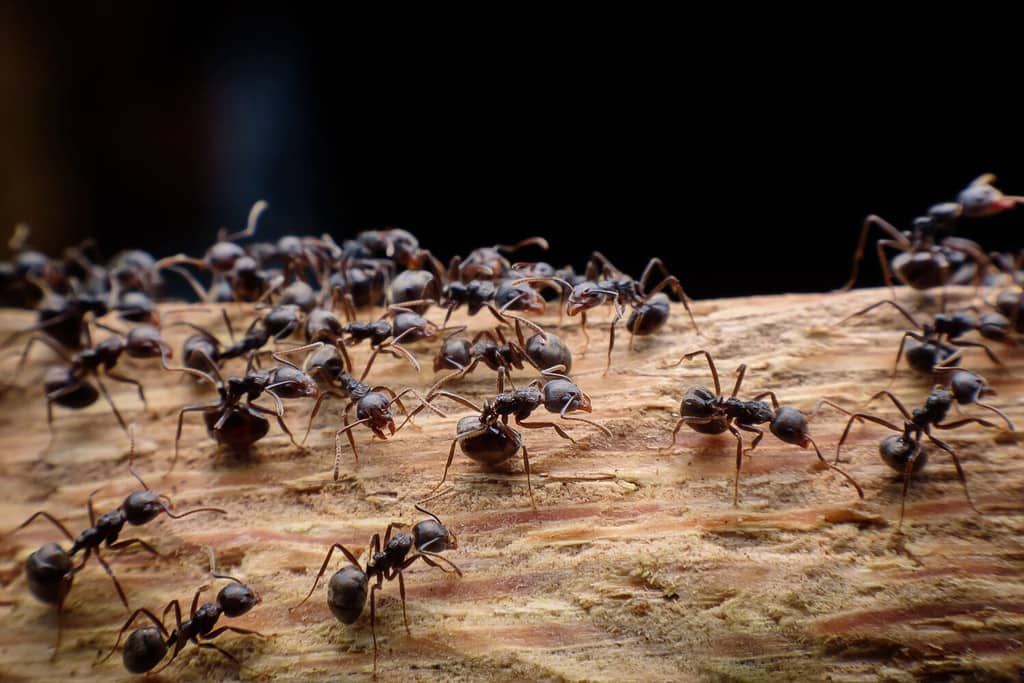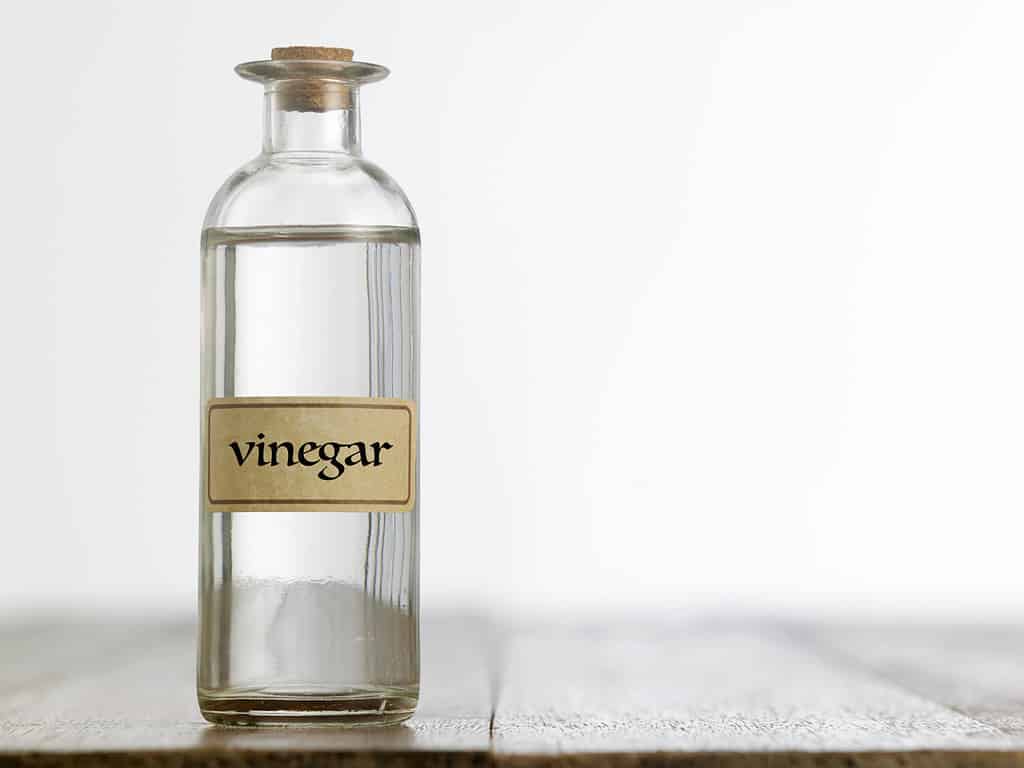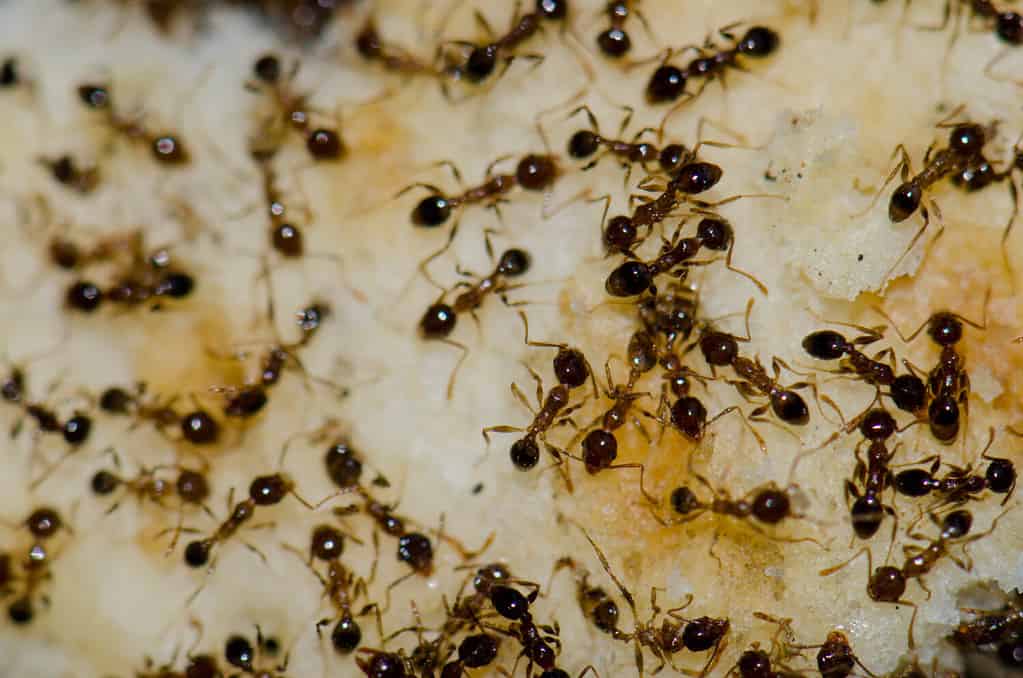Keep Ants at Bay with this Common Kitchen Staple
The heartwarming atmosphere in the kitchen and the pleasant aroma of delicious food and delicacies, combined with the sweet sounds of lighthearted chit-chat, can quickly lose its charm when you spot the silent, determined march of a line of unwanted crawling bodies – ANTS!
But wait! This is not the time to sink into despair because the answer to your dilemma sits right under your nose. You’ll be pleased to hear you can keep ants at bay using a common kitchen staple: vinegar!
Let’s explore how the humble vinegar, this readily available household item, can serve as your first defense against ant infestations and help you maintain a pest-free kitchen environment.
What Types of Ants are Found in the Kitchen?
Throughout the United States, a handful of ant species have established themselves as frequent visitors to kitchens, each with its own set of behaviors and feeding preferences. The following types of ants are regular visitors in U.S. kitchens:
- Odorous house ants (Tapinoma sessile): Tiny brown or black ants emit a foul odor when crushed. They’re often attracted to sugary foods.
- Argentine ants (Linepithema humile): These ants are tiny, light to dark brown, and often form extensive colonies. They are known to invade kitchens for sweets and other food sources.
- Pharaoh ants (Monomorium pharaonis): Pharaoh ants are tiny and light yellow to red-brown. They are notorious for infesting kitchens and other food storage areas.
- Pavement ants (Tetramorium caespitum): These ants are typically dark brown or black and often nest near pavement or in cracks. They’re known to enter kitchens in search of sugary or greasy foods.
- Little black ants (Monomorium minimum): These tiny black ants are common household pests in many regions of the United States, and you can often find them in the kitchen.
- Carpenter ants (Camponotus spp.): Carpenter ants are more prominent in size than many other ant species and can vary in color, but they are often black or reddish-brown. They do not consume wood but can cause damage to homes by excavating wood for nesting. If they find food in your kitchen, they may forage there.

©ArtLovePhoto/Shutterstock.com
How Does Vinegar Keep Ants at Bay?
You can use many types of vinegar to keep ants at bay, but white vinegar is the most recommended option. White vinegar has a strong smell and a high acidity level, which makes it effective at keeping ants out of the kitchen. Apple cider vinegar can also work, but it has a slightly sweeter scent, and some people find it less effective than white vinegar.
White vinegar can help eliminate ants due to its strong odor, acidic nature, and ability to disrupt the ants’ ability to follow scent trails. Vinegar has a strong and pungent smell that many ants find unpleasant. The scent can mask the pheromone trails ants use to communicate with each other, making it difficult for them to find their way to food sources or back to their nest.
Vinegar can disrupt pheromone trails. Ants use pheromone trails to mark the path to a food source. These trails are like roadmaps that help other ants locate the same food source. When vinegar is sprayed or applied along these trails or near entry points, it can disrupt the pheromone signals, confusing the ants and preventing them from navigating back to your kitchen or pantry. They will also struggle to find their way back to their nest.
Vinegar is acidic, which can be harmful to ants. The acetic acid in vinegar can irritate their bodies and deter them from entering an area where you have applied the vinegar. While it’s not typically harmful to humans or pets in small quantities, ants are more sensitive to the acidity levels in white vinegar.

©focal point/Shutterstock.com
How to Use Vinegar to Get Rid of Ants?
So, to engage in the war against these pesky ants, you need to have an effective attack strategy. Here are a few simple steps that you could follow to get rid of your ant problem and deter them from coming back into your kitchen or living space.
Gather your materials:
- White vinegar
- Water
- Spray bottle
Create a vinegar solution:
- Mix equal parts white vinegar and water in a bowl. For example, if you use one cup of white vinegar, add one cup of water. This dilution helps reduce the vinegar’s strength while maintaining its effectiveness.
Fill a spray bottle:
- Pour the vinegar and water solution into a clean spray bottle. The spray bottle will make it easier to apply the mixture precisely.
Identify where the ants enter your home:
- Locate the areas where ants are entering your home or where they are most active. Common entry points include windowsills, door thresholds, wall gaps, and floor cracks.
Spray the vinegar solution:
- Thoroughly spray the vinegar solution along these entry points and any areas where ants are trailing or congregating. Be sure to coat the surfaces where ants are most active.
Wipe down surfaces:
- If you’re dealing with an ant problem in your kitchen or on food preparation surfaces, wipe down these surfaces with the vinegar solution. Thoroughly wiping the surfaces will help eliminate or distort ant scent trails and discourage them from returning to these areas.
Repeat as necessary:
- Reapply the vinegar solution as needed, especially after cleaning or if you notice ants returning. Persistence is critical in deterring ants using vinegar.
Maintain cleanliness:
- Keep your home clean and free of food debris to prevent attracting ants. Regularly clean up spills and crumbs, and store food in airtight containers.

©Sergio Rojo/Shutterstock.com
Other Ways to Keep Ants Out of Your Kitchen
Clean Your House
If your house, especially your kitchen, is not cleaned correctly, it becomes an ideal place for ants to find shelter, food, and water. So, removing the food and water sources can keep these unwanted guests away.
Let’s consider a few simple precautions to ensure you can enjoy an ant-free home.
Clean all the dirty dishes in your sink regularly. When dishes and cutlery are clean and dry, pack them away immediately. If you have a dishwasher filled with dirty dishes, ensure the door is closed properly to prevent ants from entering.
Clean the floors by sweeping and vacuuming before ants pounce on liquid spills and food particles. Wipe the countertops, sinks, and other surfaces in the kitchen with a suitable disinfectant. Remove food particles that could have fallen between kitchen appliances and cupboards.
Take the garbage out at least once a day and use a bin that has an airtight lid, and trashcans should not be allowed to overflow.
Store Food Properly
Do not let food stand in the open, which will attract ants. You must store leftovers in airtight containers. The tiniest amount of food will signal hungry worker ants to find a way to reach it and carry it to their nest. From that point, they will line up along that path and signal more ants to join the fray.
Dispose of food where you have discovered that ants have already managed to gain entry. The ants may have infected the food, so it is better to be safe than sorry.
Don’t let your pet’s food and water stay out through the night or for long periods during the day. The exposed pet food will be an open invitation for ants to enjoy some delicious snacks. Although pets’ food bowls may be empty, there may be some food residue, which will still attract ants. Clean the bowls and put them away. Always keep your pet’s unused food in airtight containers.

©Victor Suarez Naranjo/Shutterstock.com
Take Care of House Maintenance
Seal entry points include cracks, gaps, and holes in walls, windows, and doors. Sealing these crevices will help prevent ants from entering your home. Use suitable caulking materials for sealing these potential ant entry points.
Fix all leaky pipes or faucets so no standing water or damp areas are inside your home. As with food, available water attracts ants, especially in dry conditions outside your home. A clean and dry sink will not be an attraction for ants.
Place Baits for Ants
Consider using ant bait traps that contain ant poison. These traps can effectively control ant infestations by attracting ants to take the bait to their nests.
Natural Repellents
When you have discovered where ants have gained entry, you can line these entryways with natural repellents that ants hate. Examples of items you may have in your home are lemon juice, essential oils, baking soda, baby powder, chalk, bay leaves, cinnamon, and peppermint oil. Place these substances where you find ants, and they will stop entering your house at that point. You can also empty coffee grounds on colonies in your yard. Coffee grounds confuse ants, so they lose track of scent trails. Spread fresh coffee grounds where ants congregate and reapply once a year.
When to Call a Professional for Ant Infestation
Remember that while vinegar and other natural repellents may be helpful short-term solutions for deterring ants, you may not have a permanent fix for a significant ant infestation. If you have a severe ant problem, you may want to consider contacting a pest control professional for a more comprehensive and integrated solution.








